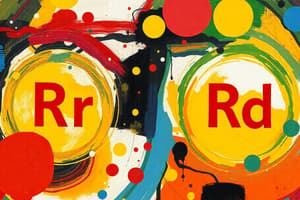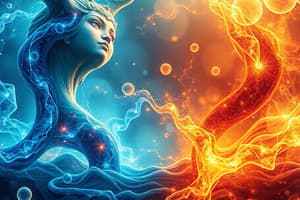Podcast
Questions and Answers
What is the oxidation state of each atom in the molecule Cl2?
What is the oxidation state of each atom in the molecule Cl2?
- One Cl atom has an oxidation state of +1 and the other -1
- Both Cl atoms have an oxidation state of 0 (correct)
- Both Cl atoms have an oxidation state of -1
- Both Cl atoms have an oxidation state of +1
In the compound GeO2, what is the oxidation state of germanium (Ge)?
In the compound GeO2, what is the oxidation state of germanium (Ge)?
- +4 (correct)
- -2
- +2
- 0
For the ionic compound CaCl2, what is the oxidation state of calcium (Ca)?
For the ionic compound CaCl2, what is the oxidation state of calcium (Ca)?
- 0
- +2 (correct)
- +1
- -2
What is the total oxidation state for all atoms in the compound NaCl?
What is the total oxidation state for all atoms in the compound NaCl?
In the polyatomic ion NO3–, what is the oxidation state of nitrogen (N)?
In the polyatomic ion NO3–, what is the oxidation state of nitrogen (N)?
What occurs during the oxidation part of a redox reaction?
What occurs during the oxidation part of a redox reaction?
In the reaction 2 Na(s) + Cl2(g) → 2 Na+ + 2 Cl–(s), which species acts as the oxidizing agent?
In the reaction 2 Na(s) + Cl2(g) → 2 Na+ + 2 Cl–(s), which species acts as the oxidizing agent?
What type of reaction involves O2 as a reactant and releases a significant amount of energy?
What type of reaction involves O2 as a reactant and releases a significant amount of energy?
Which statement best defines the oxidation number in a chemical process?
Which statement best defines the oxidation number in a chemical process?
In the reaction 4 Na(s) + O2(g) → 2 Na2O(s), what do the Na atoms convert into?
In the reaction 4 Na(s) + O2(g) → 2 Na2O(s), what do the Na atoms convert into?
Flashcards
Oxidation-Reduction Reaction
Oxidation-Reduction Reaction
A chemical reaction where electrons are transferred from one reactant to another.
Oxidation
Oxidation
The loss of electrons in a chemical reaction.
Oxidation State
Oxidation State
A number assigned to each element in a reaction to track electron transfer
Oxidation State of Free Element
Oxidation State of Free Element
Signup and view all the flashcards
Reduction
Reduction
Signup and view all the flashcards
Combustion Reaction
Combustion Reaction
Signup and view all the flashcards
Oxidation State of Monatomic Ion
Oxidation State of Monatomic Ion
Signup and view all the flashcards
Sum of Oxidation States in Compound
Sum of Oxidation States in Compound
Signup and view all the flashcards
Oxidation Number
Oxidation Number
Signup and view all the flashcards
Oxidation State of Oxygen
Oxidation State of Oxygen
Signup and view all the flashcards
Study Notes
Oxidation-Reduction Reactions
- Oxidation-reduction (redox) reactions involve electron transfer between reactants.
- Oxidation is the loss of electrons, while reduction is the gain of electrons.
- Examples include rusting of iron (4 Fe(s) + 3 O₂(g) → 2 Fe₂O₃(s)), combustion of octane (2 C₈H₁₈(l) + 25 O₂(g) → 16 CO₂(g) + 18 H₂O(g)), and combustion of hydrogen (2 H₂(g) + O₂(g) → 2 H₂O(g)).
- Sodium reacting with chlorine (2 Na(s) + Cl₂(g) → 2 NaCl(s)) is another example, where electrons transfer from sodium to chlorine.
Combustion as Redox
- Combustion reactions are a type of redox reaction where oxygen is a reactant.
- These reactions often release significant energy.
Combustion Reactions
-
Reactions involving oxygen as a reactant are called combustion reactions.
-
Combustion is a subclass of oxidation-reduction reactions.
Reactions of Metals with Nonmetals
- Reactions involving a metal reacting with a nonmetal often involve a conversion of free elements into ions.
- Examples given include 4 Na(s) + O₂(g) → 2 Na₂O(s) and 2 Na(s) + Cl₂(g) → 2 NaCl(s).
Oxidation and Reduction (Detailed)
- Atoms must gain or lose electrons to become ions in a redox reaction.
- Oxidation and reduction always occur together – one substance loses electrons while another gains them.
- When something loses electrons it undergoes oxidation and is called the reducing agent
- When something gains electrons it undergoes reduction and is called the oxidizing agent
Oxidation States
- Oxidation/reduction reactions also require a method to calculate how many electrons are transferred
- Chemists quantify this in reactions by assigning oxidation states to different elements in a reaction.
- Oxidation number: A positive or negative number assigned to an element to indicate its degree of oxidation/reduction in a substance based on rules.
Rules for Assigning Oxidation States
- Rule 1: Free elements have an oxidation state of 0 (e.g., Na = 0, Cl₂ = 0 in 2 Na(s) + Cl₂(g) → 2 NaCl(s))
- Rule 2: Monatomic ions have an oxidation state equal to their charge (e.g., Na = +1, Cl = -1 in NaCl)
- Rule 3: The sum of all oxidation states in a neutral compound equals 0. The sum of the oxidation states of all atoms in a polyatomic ion equals the charge on that ion. (e.g., Na=+1 and Cl=-1 in NaCl, (+1)+(-1)=0 or N=+5 and O=-2 in NO₃, (+5) +3(-2)=-1).
Further Examples of Oxidation Numbers, Oxidation, and Reduction
-
Oxidation occurs when an atom's oxidation state increases during a reaction.
-
Reduction occurs when an atom's oxidation state decreases during a reaction
-
Example : Sn⁴⁺ + Ca → Sn²⁺ + Ca²⁺ (Ca is oxidized/reducing agent, Sn⁴⁺ is reduced/oxidizing agent)
-
Another example : F₂ + S → SF₄ (S is oxidized/reducing agent, F₂ is reduced/oxidizing agent)
-
Example: CH₄ + 2O₂ → CO₂ + 2H₂O (C is oxidized, O is reduced)
Studying That Suits You
Use AI to generate personalized quizzes and flashcards to suit your learning preferences.




